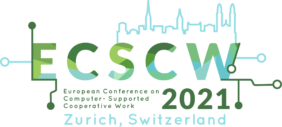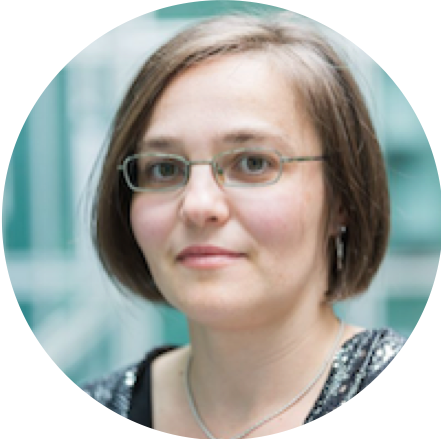Masterclasses
Masterclasses proposals are not anonymous and should include all authors names, affiliations, and contact information.
Important Dates
- February 5, 2021 Submissions due for masterclasses proposals
- February 15, 2021 Notifications to masterclasses organizers
- March 1, 2021 Deadline for the camera-ready proposals for accepted masterclasses
- June 7-8, 2021 Masterclasses at the University of Zurich
- June 7-11, 2021 ECSCW 2021 Conference News
- February 5, 2021 – Submissions due for masterclasses proposals
- February 15, 2021 – Notifications to masterclasses organizers
- March 1, 2021 – Deadline for the camera-ready proposals for accepted masterclasses
- June 7-8, 2021 – Masterclasses at the University of Zurich
- June 7-11, 2021 – ECSCW 2021 Conference News
- February 5, 2021
Submissions due for masterclasses proposals - February 15, 2021
Notifications to masterclasses organizers - March 1, 2021
Deadline for the camera-ready proposals for accepted masterclasses - June 7-8, 2021
Masterclasses at the University of Zurich - June 7-11, 2021
ECSCW 2021 Conference News
Submission Format & Process
Masterclasses submissions should:
- – be no more than 1500-3000 words, excluding references,
- – include all authors names, affiliations, and contact information as well as a description of the theme(s) of the master class, the background of the organiser(s), the length of the masterclass (half-day/ full-day) and the maximum number of participants,
- – specify any additional equipment needed (including laptops, tablets, speakers, headphones, projectors). Unless explicitly confirmed by the Chairs, the additional equipment must be supplied by the masterclass organisers,
- – be formatted according to the ECSCW2020 template, available in LaTeX, RTF or MS Word format,
- – be sent in pdf format via email to workshops2021@ecscw.eusset.eu.
Masterclasses submissions are not anonymous.
Masterclasses Chairs
For any queries, please, do not hesitate to contact the ECSCW 2021 Masterclasses Chairs at workshops2021@ecscw.eusset.eu.
Uppsala University, Sweden
Inria Research, France
Masterclasses submissions should:
- – be no more than 1500-3000 words, excluding references,
- – include all authors names, affiliations, and contact information as well as a description of the theme(s) of the master class, the background of the organiser(s), the length of the masterclass (half-day/ full-day) and the maximum number of participants,
- – specify any additional equipment needed (including laptops, tablets, speakers, headphones, projectors). Unless explicitly confirmed by the Chairs, the additional equipment must be supplied by the masterclass organisers,
- – be formatted according to the ECSCW2020 template, available in LaTeX, RTF or MS Word format,
- – be sent in pdf format via email to workshops2021@ecscw.eusset.eu.
Masterclasses submissions are not anonymous.
Masterclasses Description
Masterclasses provide the opportunity to learn about specific CSCW methods, concepts and approaches from experts in the related field within small in-depth group discussions. Masterclasses facilitate a more focused discussion on any CSCW topic, and enable organizers to do theoretical input in lectures as well as engage participants in more hands-on workshop experiences. While masterclasses are open to a broad range of participants, these are particularly targeted at early career researchers and PhD students. Masterclasses may be half-day or full-day sessions.
For inspiration, see the list of masterclasses at ECSCW 2019: https://ecscw.eusset.eu/2019/masterclasses-program/
Selection Process
Proposals will be single-blind reviewed by the Masterclasses Chairs and selected members of the ECSCW program committee. Selection will be based on the relevance of the proposed topic for ECSCW and the organiser(s) expertise.
Publication & Copyright Information
Accepted proposals and programs will be published in the European Society for Embedded Technologies (EUSSET) digital library http://www.eusset.eu/digital-library.
The EUSSET digital library (DL) is an open access repository. The EUSSET DL does not ask for transfer of copyright from authors. The EUSSET DL does, however, require sufficient rights that allow “readers to read, download, copy, distribute, print, search and link to the full texts of articles, or use them for any other lawful purpose except where otherwise noted” (full info here: https://www.eusset.eu/digital-library/).
The authors will have several options when it comes to copyright upon paper acceptance:
In order to submit an article to EUSSET DL, the submitter must either:
- • grant EUSSET DL a non-exclusive and irrevocable license to distribute the article, and certify that he/she has the right to grant this license;
- • certify that the work is available under one of the following Creative Commons licenses and that he/she has the right to assign this license:
- Creative Commons Attribution license (CC BY 4.0)
- Creative Commons Attribution-ShareAlike license (CC BY-SA 4.0)
- Creative Commons Attribution -Noncommercial-ShareAlike license (CC BY-NC-SA 4.0);
- or dedicate the work to the public domain by associating the Creative Commons Public Domain Dedication (CC0 1.0) with the submission.
- • In the most common case, authors have the right to grant these licenses because they hold copyright in their own work.


